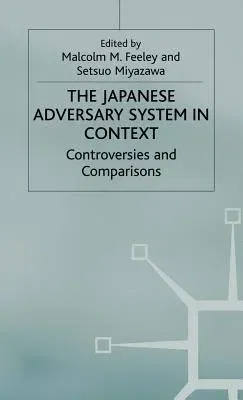M Feeley
(Author)The Japanese Adversary System in Context: Controversies and Comparisons (2002)Hardcover - 2002, 16 July 2002

Qty
1
Turbo
Ships in 2 - 3 days
In Stock
Free Delivery
Cash on Delivery
15 Days
Free Returns
Secure Checkout

Part of Series
Advances in Political Science
Print Length
262 pages
Language
English
Publisher
Palgrave MacMillan
Date Published
16 Jul 2002
ISBN-10
0333920600
ISBN-13
9780333920602
Description
Product Details
Authors:
Book Edition:
2002
Book Format:
Hardcover
Country of Origin:
US
Date Published:
16 July 2002
Dimensions:
14.63 x
22.96 x
2.46 cm
Genre:
Asian - General
ISBN-10:
0333920600
ISBN-13:
9780333920602
Language:
English
Location:
London
Pages:
262
Publisher:
Weight:
553.38 gm